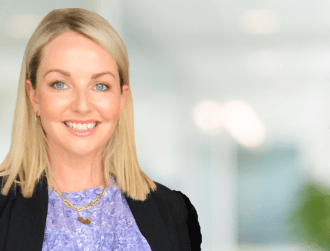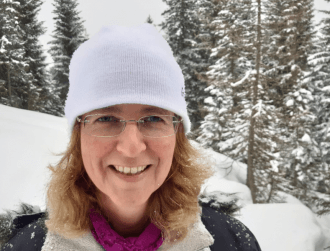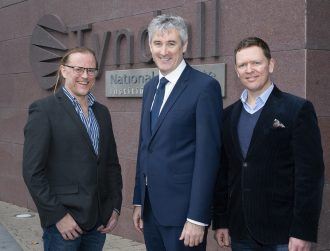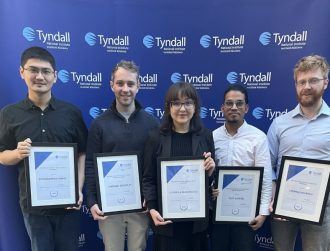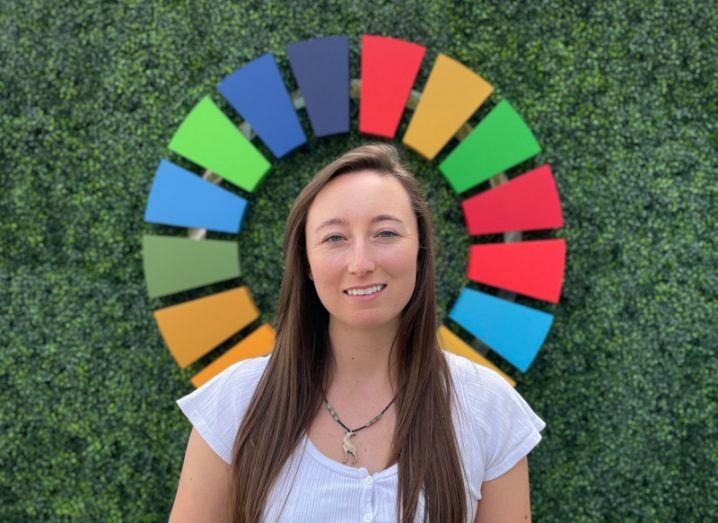
Image: Ciara Judge
Former BTYSTE winner Ciara Judge on why she thinks Ireland is great at nurturing talented teens and how the skills she learned at 13 still stand to her today.
Before we get into what Ciara Judge is doing at the moment, it is necessary to provide a bit of background information. You see, this is not Judge’s first rodeo; the science researcher, communicator and entrepreneur was featured in our Women Invent series in 2016. At the time, she was 18 years old, studying for her Leaving Cert and involved in the running of three start-ups.
At the tender age of 15, she won the BT Young Scientist and Technology Exhibition (BTYSTE) along with two other teens, Sophie Healy-Thow and Emer Hickey. The winners of BTYSTE are more often than not destined for great things, but Judge proved particularly exceptional.
Whirlwind few years
After winning the competition, she had a whirlwind few years, winning awards all around her. She was a member of the winning team at the 2014 Google Science Fair and she was named one of Time Magazine’s most influential teenagers the same year.
By the time she spoke to SiliconRepublic.com in 2016, she admitted she was going to take a while to concentrate solely on her studies. The three start-ups and her speaking engagements were on the back burner briefly.
Fast-forward to 2024, and Judge, now in her mid-twenties, has long left the Leaving Cert behind her. “Oh, wow, how times have changed since then,” she says when we remind her of the 2016 interview. “A lot has happened since then, but all good things.”
Now close to the end of a PhD in London, she catches us up on what she’s doing at the moment. Sci-tech and public-speaking still feature heavily.
“Shortly after I last spoke [to SiliconRepublic.com] I went to University College Cork (UCC) to do a bachelor of science in genetics. I had a really good four years in UCC, very nicely funded by the Quercus scholarship programme. And then after that, in 2020, I went to Cambridge to do a master’s in computational biology.”
Cork to Cambridge, and a pandemic
Her move to Cambridge coincided with the pandemic, which proved fortuitous for Judge. At the very least, it shaped her research interests. “During that time, for my thesis project, I worked with the European Bioinformatics Institute on a pipeline for analysing SARS-CoV-2, which is the disease agent behind Covid-19.”
The work was focused on the analysis of the evolution of genetic sequences from Covid-19. She used the information she found to inform the design of antibody treatments by the Cambridge Department of Chemistry.
That led her to a PhD in infectious disease modelling at the London School of Hygiene and Tropical Medicine. “Basically, I work on developing methods and software for people to model and track the spread of infectious disease outbreaks.” She uses traditional epidemiological data, such as case incidents, as well as genetic data.
Destiny calling
Does she think she might have ended up doing something different if the pandemic never happened? While Judge agrees that she might not have ended up in infectious disease research specifically, she believes that she has always been “destined” to end up where she is today. “If I look at the day-to-day of what I do – it’s a little bit of genetics, a little bit of computers and computer programming and maps all mixed up together – that was, I think, very much where I’ve kind of been destined to be from the start.”
By ‘the start’, she means BTYSTE, an experience she still credits with changing her life. She had the opportunity to reflect on that formative time in her life recently when she attended the 6oth edition of BTYSTE earlier this month. “It really struck me, first of all, how lucky I was to have gotten so many opportunities.”
She says that even just competing at the event taught her so much. “I rely on skills now in my PhD that I learned doing a project at the age of 13.” Her favourite parts of that project, which focused on the effects of bacteria on plant germination, were always the statistical and data analysis aspects. “So, I think I knew that I was heading into something statistical or mathematics, but I loved the biology too. I think it’s been a really natural progression for me to end up in the sphere of computational biology.”
Perhaps her entrepreneurial instincts led her to apply these skillsets and interests to infectious disease modelling, which she says is “super topical now after this pandemic”.
Sharing her experiences with the next generation
“It’s just one use of this skillset, but it’s a really interesting use, especially after the pandemic, because there’s a lot of interest from the public and from governments in how we can be more prepared for the next pandemic. I think that that’s what I find very interesting, the fact that it’s so applicable, and you can really feel like the research that you do day to day is potentially making an impact in people’s lives. I think that can be really rewarding.”
Judge will get the opportunity to speak about her research to a very special audience as part of the upcoming I Wish event on 8 February. She will address more than 3,000 young women and girls as part of the event which showcases STEM careers and STEM role models to teen girls. Judge is no stranger to I Wish, having spoken at the very first showcase back in 2015.
She is looking forward to returning and sharing her passion for her work with the attendees, although the experience will be different because when she first spoke at the event she was at a similar stage in life to the audience.
When we ask how she feels about the need for events like I Wish specifically for boosting women and girls’ engagement in STEM, she is very candid in her response. “I didn’t fully appreciate it in my youth,” she says of the lack of representation of women in sci-tech. “After we won BTYSTE and the Google Science Fair, we were marketed as the poster children for girls in STEM and would speak at a lot of girls in STEM events – and I think because I had a lot of success very early, a lot of the barriers that women in STEM face that were being discussed at these events, I actually felt like I couldn’t relate to,” she says.
“I was there as more of an inspirational figure, but I couldn’t necessarily speak about the challenges that much.” Somebody who knows all about the barriers women face in STEM is Furkan Karayel, who will also speak at I Wish this year. As she has grown older and gained more experience, Judge says she has “come to understand the challenges and obstacles faced by women in STEM with a lot more depth”.
She hopes that she will be able to give this year’s I Wish attendees some pointers on the situation based on her experiences. She praises I Wish’s co-founders Gillian Keating and Caroline O’Driscoll for identifying the need for an event like I Wish nearly 10 years ago. Overall, she says Ireland is one of the best countries for supporting teens with good ideas – and schemes like I Wish and BTYSTE are proof.
‘We were really, really lucky’
Before we let Judge return to her PhD work, we ask her something of a personal question. Did she ever feel overburdened by the expectations placed on her at such a young age? “I think I did to be honest – and I think I even still do now sometimes,” she says. Clarifying that she is only speaking from her own experience, she says she has been fortunate to have strong family support, as well as great support from UCC and BTYSTE.
“The staff at UCC and BT did an absolutely excellent job of looking out for its young people, myself included.” She remarks that this has been something she has been thinking about recently. “I think Irish teenagers are so incredibly lucky that we have things like BTYSTE, and that we have opportunities for teens to get involved in science at a very young age. Another country that has that sort of ecosystem is America and particularly around hubs like Silicon Valley. I’ve had the opportunity to meet with a lot of kids from those ecosystems, and I think Ireland does a really excellent job at minding its young people,” she says.
Having been to Silicon Valley and seen how the other half lives, so to speak, she is grateful for having grown up in Ireland, which doesn’t put too much pressure on its young people, she feels. “I think that that’s a really important balance to achieve, but luckily, any organisation that I’ve worked with in Ireland has done it really, really well.
“We got thrust into the spotlight at a very young age, and didn’t necessarily have the most conventional teenage years or college years. But we were really, really lucky.”
10 things you need to know direct to your inbox every weekday. Sign up for the Daily Brief, Silicon Republic’s digest of essential sci-tech news.

